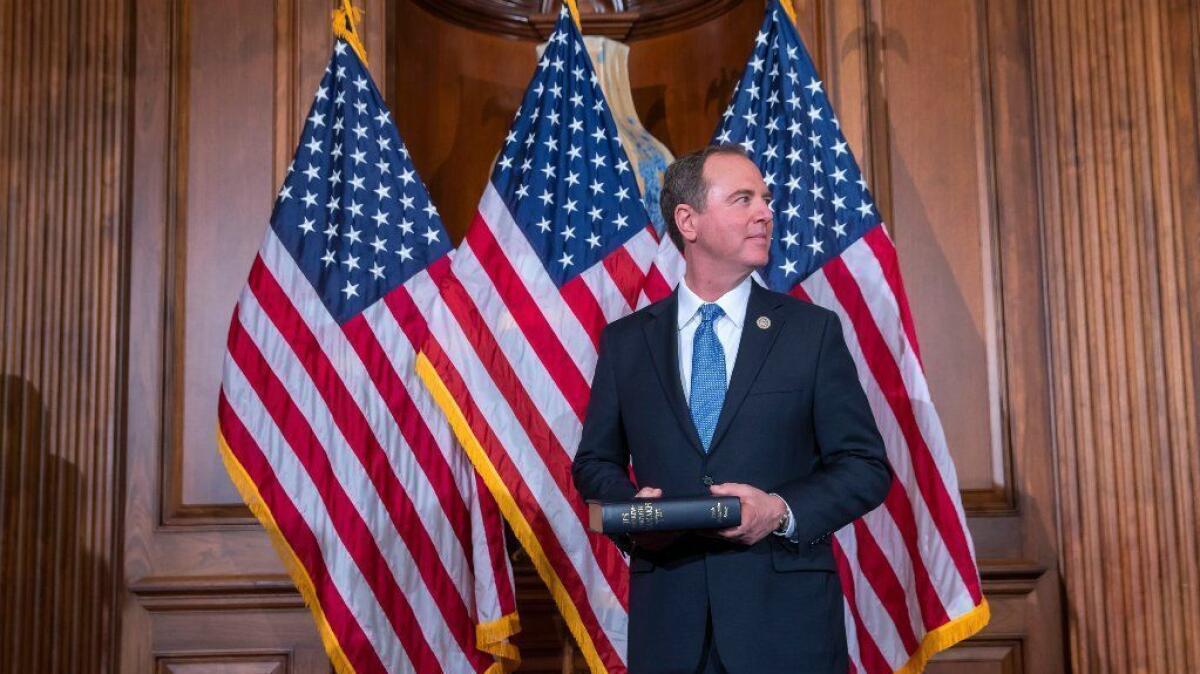House Intelligence Committee prepares to reopen Russia inquiry without GOP support

- Share via
Reporting from Washington — Newly empowered Democrats on the House Intelligence Committee are preparing to reopen the panel’s investigation into Russian meddling in the 2016 election, seeking new interviews and financial records even as Republicans appear ready to boycott the inquiry.
Republicans who previously led the committee ended the investigation last March by concluding they had found no evidence of conspiracy between President Trump’s campaign and operatives in Moscow.
House Minority Leader Kevin McCarthy (R-Bakersfield) said Republicans had no interest in participating in the revived inquiry, which will be led by Rep. Adam B. Schiff (D-Burbank), the new chairman.
“Now they just want to do something they’ve already investigated before?” McCarthy said. “I don’t think that’s what the American public would think is the right thing to do with the majority.”
The partisan rift, a mirror image of last year’s bitter fight over the Russia probe, emerged before the committee holds its first meeting of the new congressional session or Republicans name their members to it.
Schiff said he had not spoken to Rep. Devin Nunes (R-Tulare), the former chairman and now ranking member, since the Nov. 6 midterm election. Their once collegial relationship ruptured during the Russia investigation that Democrats are now reviving.
Schiff plans to provide special counsel Robert S. Mueller III with unredacted transcripts of the committee’s closed-door interviews with witnesses, which could be fodder for criminal charges.
Michael Cohen, President Trump’s former personal lawyer, recently pleaded guilty to lying to Congress about pursuing a Moscow hotel and condominium proposal on Trump’s behalf during the 2016 campaign. Cohen is scheduled to testify publicly before the House Oversight Committee on Feb. 7 and he could meet again with the House Intelligence Committee behind closed doors.
Democrats have beefed up resources on the intelligence committee, adding more people with investigative experience to supplement their roster of analysts.
Schiff said he’s ready to request documents, sometimes with subpoenas, that Republicans did not seek when they led the committee.
“There are any number of records that would have made sense, frankly, to have had before,” he said.
Follow the latest news of the Trump administration on Essential Washington »
Phone records for Donald Trump Jr. are a probable target since he made three calls to a blocked number around the time he met with a Russian lawyer at Trump Tower in June 2016. Trump Jr. has said he doesn’t recall whom he called and the president has denied knowing about the meeting when it occurred.
The committee also may seek records from Deutsche Bank, which has paid hundreds of millions in fines for assisting Russian money laundering. The bank was willing to loan to Trump when U.S. banks wouldn’t because of his multiple bankruptcies.
“We know Russia uses financial distress as a way to compromise individuals,” said Rep. Eric Swalwell (D-Dublin), a committee member. “If the president is compromised financially by the Russians, that’s something that comes under our committee’s jurisdiction.”
Jack Langer, a spokesman for committee Republicans, said Democrats are chasing conspiracy theories.
“The Democrats are obviously excited to pursue their myriad Russia conspiracy theories because, after two years of investigations by numerous Congressional committees, the FBI, the special counsel, and every media outlet in America, the lack of evidence of a nefarious collusion plot seems to upset them,” he said in a statement.
Democrats described last year’s Republican inquiry as a whitewash. In particular, the Republican report said Russia’s interference in the 2016 campaign was not aimed at helping Trump beat Hillary Clinton, a conclusion that contradicted that of the nation’s intelligence agencies.
Democrats have four new members of the committee — Reps. Val Demings of Florida, Raja Krishnamoorthi of Illinois, Sean Patrick Maloney of New York and Peter Welch of Vermont — who all have a legal or law enforcement background.
“To the extent we have to investigate the president, we have to,” Krishnamoorthi said. “But to me, the purpose is to prevent future wrongdoing.”
More to Read
Get the L.A. Times Politics newsletter
Deeply reported insights into legislation, politics and policy from Sacramento, Washington and beyond. In your inbox three times per week.
You may occasionally receive promotional content from the Los Angeles Times.











